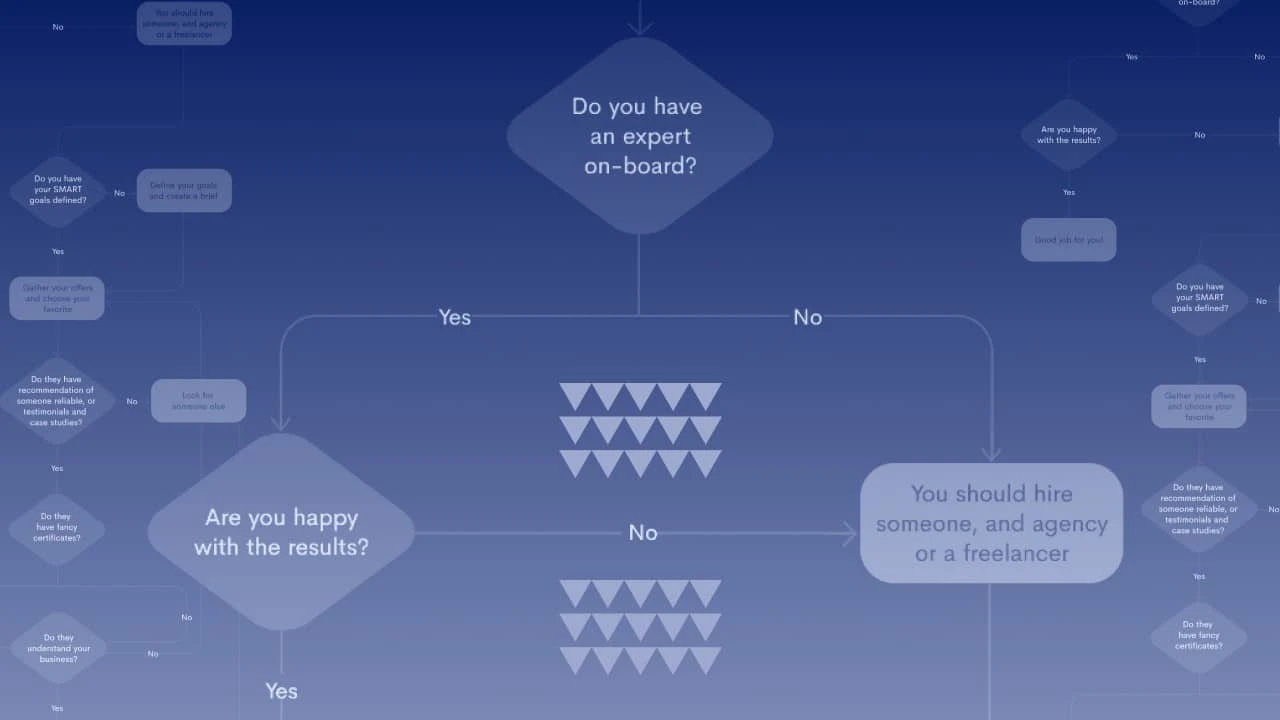I’ve been hiring and have been hired as a PPC specialist. And having worked with agencies and for agencies, I have experienced multiples procurement processes. Some of them took 3 minutes, others 3 months. In this article, you’ll find the most important insights and things to consider when you want to hire a PPC agency, performance marketing agency, SEM agency, or any other team of digital marketing specialists.
Table of contents
What is a PPC agency?
It’s an agency who runs your pay-per-click campaigns, like Google Ads, Facebook Ads, Bing Ads, Quora Ads, LinkedIn Ads etc. However bear in mind that you usually go to an agency for a package of services and PPC may be one of them but the list below fits into other types of agencies as well.
Why work with a PPC agency?
To make sure your marketing budget is spent effectively and your sales increases. Although more and more activities may be automated these days, it’s still crucial to have someone who can understand and optimize this area of your marketing. The bigger your budget is the more you can get by hiring an experienced person to do that. But no matter if it’s someone within your team, a freelancer or an agency – most of the tips from this article should be useful for you.
Define your goals
This should be obvious but I’m surprised how often it’s not. Defining a clear goal is the most important thing for you, (not for the people you’ll work with). Saying that your goal is “to boost sales” may be tempting but I encourage you to give it more than a minute and make clear what exactly do you expect from this cooperation.
Make it SMART
Your goal should be measurable and time-bounded. If you want to increase sales ask yourself “how much” and “when”.
Align it with company goals
If you or your department have a goal for the next quarter or year – keep your agency goals consistent with it. You’ll play in the same team, your goals should be the same.
Look at the right metrics
Think about your business model, sales attribution, current results, and outside activities that may influence future results. Digital marketing is measurable but you can’t measure and predict everything (I think 2020 proved that even more than we wanted) so think not only about results but also projects done and soft winnings. I’d rather have an agency who’s not afraid to experiment even if the first experiments failed and short-term results don’t look good.
Keep it open
Don’t limit your future partners to one channel or one activity. If they are proactive and during your cooperation, they will see potential in some project completely different than what you’ve initially agreed – be ready to go for it. Goals and plans have to be flexible.
Scan their portfolio
Again, this may sound obvious but I will try to give you a few hints on what to look for inside their portfolio and what should raise a red flag.
Look for companies you know
Recommendations from people you trust are the best indicator if the partner is trustworthy. On the company’s website, everything always looks amazing. Conversion is boosting, everyone is happy and counting money. But you can get some real stories about real problems from the people who trust you enough to share it.
Look for projects similar to yours
Working for a SaaS or eCommerce store or offline business is different and requires different skills. Find out if the people you’ll be working with have some experience with your business model, audience type, and company size.
Look for tests results
Of course, we can’t expect specialists to share 100% of their know-how but if they have something to brag about – that’s always good. You can see not only good results but also their way of working. And of course, relative numbers may be misleading. 1000% of growth from 1 lead is just 10 leads so it’s not so impressive as it may sound.
Look for testimonials
If someone is willing to give a positive opinion and sign it with their name – it’s always a big plus. No doubts about that.
Certifications are not good signals
I’m talking here at advertising platform certificates like Google Partner or Facebook Blueprint certification programs but also about any kind of papers that should “prove” you’re an expert. I strongly believe real projects and real results are worth millions of certificates. There are a few reasons behind it:
1. It’s easy – Getting most of the official certificates from ads platforms like Google Ads search Certifications is quite easy to get so it’s nothing really impressive.
-
It doesn’t give you many benefits – It’s not like businesses with certifications cooperate closely with Google and have special privileges or lower prices. It doesn’t work that way. The best thing from it is that from time to time you can get faster access to beta features not available publicly. But that’s it.
-
It’s hard to evaluate them – regarding certificates granted by other parties – do you actually know who created them, what were the requirements, and who certified the certifying people? Papers like these may be a nice add-on but they shouldn’t be a priority and main criteria.
What about awards?
Similar story. Awards are good because they usually are based on a case study you can analyze but results and clients are always a better jury than any committee.
Make sure they understand your business
And I’m not talking only about the business model. It’s about your niche and market environment. If you are a sports brand – is there anyone in the agency who understands your audience, the media they read, the best channel to reach them, the vocabulary, the hottest news, the communication style, etc.
Truly passionate people (or those who can easily become passionate) of your business will usually have better results.
And in this example, we talked about sports. What about photovoltaics, artificial intelligence, fin-tech, biotechnology or other more complicated sectors. It’s not for everyone and it’s something worth considering. It’s usually a good idea to provide your partners a training which will help them to feel your business.
If they already know it – that’s perfect. If they don’t but there’s potential to overcome it – that’s good. If they don’t but they pretend to be experts – that’s a red flag.
Run a test campaign
As simple as that. It will make the recruitment process longer but you’ll have higher chances your decision will be better. While you can’t know everything after a simple test, it will give you a clear view of what to expect. And I don’t mean just results but also communication style, how they report their results, what questions they ask, and how they can perform with limited knowledge.
If they are able to deliver first results and they can feel your business even before launching full-time cooperation and knowledge exchange – you know it’s a good fit and you don’t need much more to make it truly effective.
If you don’t have enough time you can just ask for ideas and plans and compare them. Here you can find a list of interview questions for digital marketers. However, if you’re making a tender or any kind of competition for the best offer which requires a lot of preparation from the agencies it’s a good practice to compensate them for the work. The best marketers won’t spend dozens of unbillable hours just to compete with tens of other agencies.
Find out who’s going to work for you
In the final agreement make sure to ask who’s going to be your main contact and who’ll be doing the actual work. One of the most common sins of marketing agencies is to send the top people and management to get the client and then delegating the work to juniors with not so much experience.
Sometimes it’s ok if it works but it’s always good to know how the cooperation will look like. Also – you can look at the open recruitments your contractor has. If they claim to hire the best people, experts, and gurus and you can see their recruitment conditions are lower than average – you know something is off.
Prepare for a safe exit
It may sound inappropriate to think about closing the cooperation before it even started but it’s not a marriage. Most likely you won’t be working with the same agency for the end of the world so plan ahead.
Make sure your party is the owner of the ad platform accounts, all the data, and intellectual property produced during the cooperation. If you work on SEO and they gathered some backlinks, created some extra websites or anything else – make sure nothing will be stopped when your partnership will be over. If you have any doubts – ask. It’s really important to understand every term. You don’t want some unclear clause to strike back 3 years later.
As a rule of thumb, it’s a good practice to write the contract thinking about what may go wrong. If you had a guarantee that everything will go smoothly you wouldn’t need a contract in the first place.
Choose the right billing model
First, you need to agree on a budget. Some agencies will ask you about it but contrary to appearances it’s not that important for you to establish it from the start. Professionals will ask you about your goals and they will tell you how much you need to spend to achieve them. Nevertheless, you should have some ballpark numbers prepared.
Performance marketing, growth hacking, pay-per-click campaigns – all of that is done to increase sales or some intermediate goals (leads, MQLs, SQLs, brand awareness, brand recognition, customer satisfaction, etc.). It may be tempting to depend the agency fee on the results but in reality, it’s rarely as great as it sounds. Let’s take a look at some popular models.
Cost per hour
You pay for hours of specialists’ work + media + additional tools and activities (equipment, photo studio, etc.) + sometimes additional provision
+ You can see the full estimate and time table and you know exactly what you’re paying for – Every month the amount of work may differ so it’s hard to plan costs ahead – There’s no financial motivation to get better results
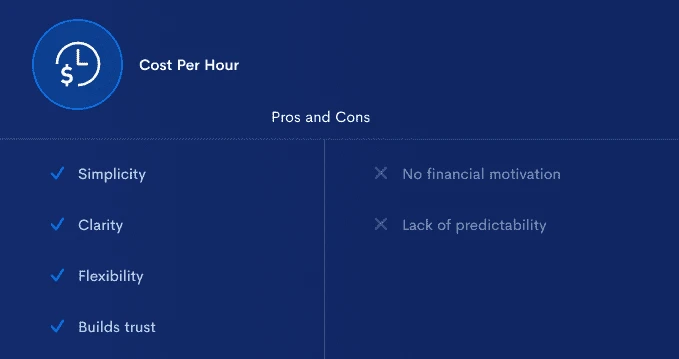
Fixed Price
Usually based on hours also but you pay the same price every month.
+ More predictability – Less flexibility – No financial motivation to expand the cooperation and go the extra mile
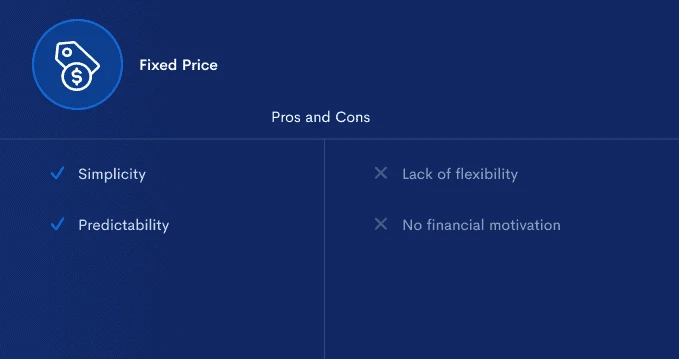
Budget-provision
You pay some % of the media budget – usually between 5%-30% depends on the scale and other factors.
+ You can easily predict and calculate the price + It financially motivates your partner to increase the scale – It doesn’t include any actual work – It doesn’t motivate the partner to cut costs
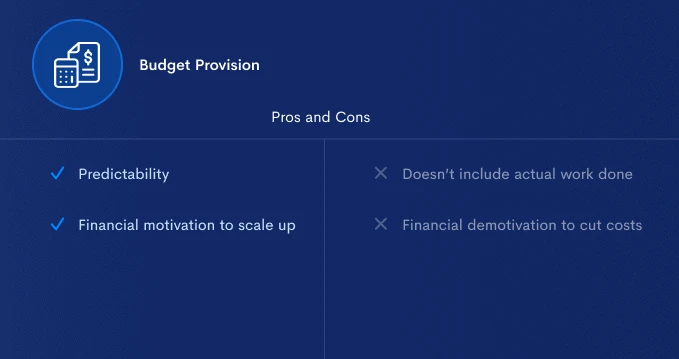
Success fee
You pay some % or fixed fee based on value – number of clients, sales, profits, leads, marketing goals, etc.
+ You pay only for the results + Motivates the partner to increase the scale – Hard to predict and calculate – It doesn’t include any actual work – Depends on lots of outside factors
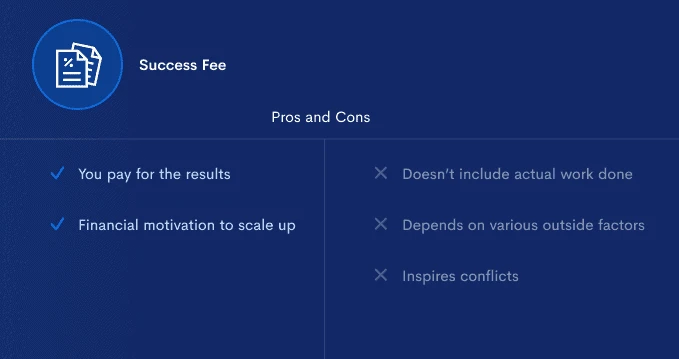
Of course, there are also hybrid models like fixed fee + success fee but there’s no point to list all of the combinations here.
So which model is the best? I strongly believe from both perspectives the simple ones are the best. A success fee may sound tempting but I will give you a few more reasons why it’s not the best idea.
-
Are you sure you have a 100% accurate attribution model to be sure which sales came from which channel? If not – this model will never be fair.
-
it will cause competition within your marketing team and people (and channels they are responsible for) will fight each other instead of cooperating.
-
Your partner is not motivated to cut costs even when they see the opportunity to do that because based on the model they don’t care about your budget. They will care only about their numbers.
-
And most important – you will limit the agency to focus on short-term results and only a few channels that are visible in your analytics tools. Instead of thinking about your business as a whole, and developing your relationships and optimizing the work to increase profits and reduce costs, they will be oriented only on their sales numbers.
A success fee is used by businesses afraid of the results and not trusting their contractors. If you trust the agency to do the right work – pay them for their time with a simple cost-per-hour model. If you don’t trust them – don’t work with them at all.
If you’re still not convinced, take a look at the Promethean Research industry report. According to them only 13% of agencies work in value-based pricing.
Pay attention to their communication style
If you already chose an agency and started the cooperation – it’s crucial to keep the communications smooth. Your role as a client here is not over. You can’t just sign the contract and wait for the results. You have to work together.
Make sure your team has everything they need to do their work but also monitor if their communication is still on the high-level or it got worse because they don’t have to fight for you anymore.
Are they sending all the reports you’ve agreed on? Are they proactive and coming up with new ideas? Do you have status calls once a week / 2 weeks? Do they respond fast to your emails?
Usually, a swift response is a very simple but a very good indicator of how motivated your agency is.
Be trusting
The communication between an agency and the client should be efficient but not disturbing. If you went through every step during the recruitment process – you’ve made the right choice and you don’t have to control every little thing.
Create a safe environment to test, inspire brave ideas, and accept that mistakes will happen and the experiments won’t always work. Otherwise achieving great results will be much harder.
It’s usually a good idea to feedback each other regularly on what to improve in your marketing activities and your cooperation. But of course, feedback works both ways. You are the client. You’re paying and you have the right to set the tone and to have expectations but be open to ideas towards your party as well.
Here’s a simple visualization of the process:

Agency or freelancer?
Sometimes you don’t need to hire the whole organization to achieve your goals. Freelancing is more and more popular and working with freelancers is usually less expensive so let’s take a look at the advantages and disadvantages of this model.
-
It’s less expensive – an agency needs to pay office managers, HR specialists, new business managers, and all of the supporting staff in their organization. With freelancers – you pay only for the work done.
-
You can start with a lower budget – to hire an agency you need to have a big project because otherwise, it won’t be profitable for them. With freelancers, you can start with a few hours per week and then extend the cooperation if needed.
-
Direct contact with a specialist – in an agency usually you talk to your account manager who then delegates the work to specialists. Working with freelancers – you can talk directly to the people on the front line.
-
Flexibility – it’s easy and fast to start and close the cooperation.
-
Requires more time – hiring an agency team is usually easier than hiring a team of freelancers who have to be contacted separately.
-
Difficult for big projects – in an agency you have a team of different specialists in every area so they can support each other. A freelancer usually has one specialization and limited time.
However, in Hire Digital, you can hire not only freelancers experienced in your sector but also easily scale up to the full team of experts so you can take advantage of the good sides of working with freelancers without its limitations. If you need to be flexible and have some additional work to be done fast – and we will find the right specialists for you.
I hope this article helped you to make the right decision.
